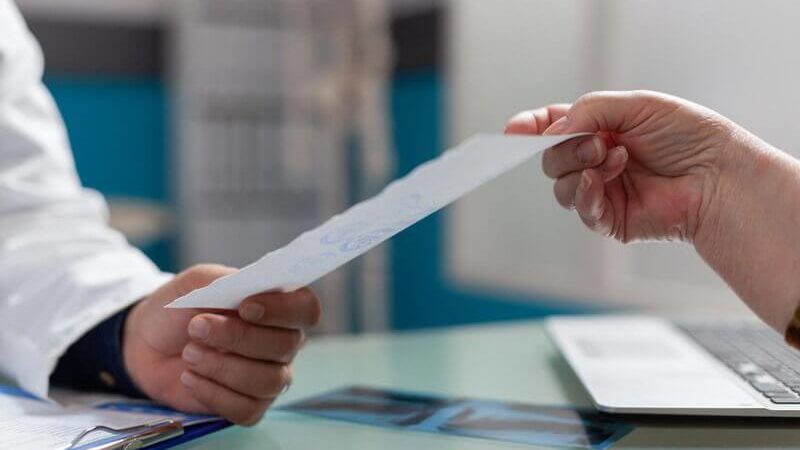What Are Medical Billing Scams And How To Avoid Them

Image by DCStudio
Being served legal papers is no fun.
So when a Mississippi consumer got a phone call asking them for an address, it was no doubt scary at first.
The caller claimed to be trying to serve papers about an unpaid medical bill. The caller even knew the person’s partial address and the last four numbers of the Social Security number.
Still, something didn’t feel right.
The person asked for the name and phone number of the business calling and immediately tried to call back. The company was called Document Delivery Services, based in Nevada.
When the person contacted the business office of the local hospital, it turned out there wasn’t an unpaid bill. It had been a scam attempt.
Luckily, that scam attempt failed.
What Are Medical Billing Scams?

Image by rawpixel.com
We’ve been to the emergency room a couple of times since moving to our current home.
Although we have good health insurance, that doesn’t keep us from getting bills in the mail. In fact, when I see that return address, I’m immediately filled with dread.
Medical debt is an ongoing problem for many consumers. And it can be tough to remember exactly what procedures you’ve had done and when.
That’s what medical billing scams target.
Medical bills can be so vague and confusing, that scammers know you might not be able to make sense of what you owe. And it’s very feasible that we might have medical debt from the past that creeps back up on us someday.
With medical bill scams, fraudsters try to convince you to give up something. It might be money, or it might be information. Either way, it could cost you.
Below are some medical bill scams currently circulating.
✎ Related: How Can Medical Identity Theft Occur ➔
The 6 Most Common Medical Billing Scams
- Hospital Representative Impersonation Scams
- Debt Collection Scams
- Insurance Representative Impersonation Scam
- Fake Bill Scams
- Appointment Confirmation Scams
- Pharmacy Scams
1. Hospital Representative Impersonation Scams
What is it? You get a phone call claiming to be from a local hospital. The representative tells you about some past-due bill in your name. No worries, though. You can pay the bill by phone. You’ll just need to provide your credit card number and expiration date. Some scammers even ask you to wire the money or pay by a gift card. You make the payment, but it goes into a fraudster’s pocket.
How to spot it: Hospitals don’t make phone calls about bills. You’ll get it in the mail. Hospitals also don’t accept payment by wire or gift card.
How to avoid it: Never give payment information in response to an incoming phone call. Instead, hang up and contact the creditor directly. If you do have a past-due bill, a call to the hospital’s billing department should be able to clear things up.
2. Debt Collection Scams
What is it? Hospital billing departments might not use the phone, but debt collectors sure do. In fact, a debt collector will call so often that you’ll want to change your number. And yes, there are hospital-related debt collection scams. With this scam, a fraudster contacts you, claiming to be collecting on a past medical debt. The caller pressures you to provide payment information and may even use threatening language.
How to spot it: A legitimate debt collector will have all the important information about your debt. That includes the name of the creditor and how much you owe. There should also be a dispute process, which will require the debt collector to get verification of the debt from the hospital. You have the right to demand detailed information about what you owe, and the debt collector has to send it within five days. Do not send the money if the debt collector can’t do that.
How to avoid it: Never pay a debt collector unless that person can provide the above information about the debt. Even then, research the collection agency and make sure it’s legitimate. Take down the caller’s phone number and call back only after you’ve thoroughly researched and verified it.
3. Insurance Representative Impersonation Scam
What is it? One scam that flourished during the COVID-19 pandemic was this one, which has scammers posing as insurance representatives. You’re entitled to free equipment or services, the representative says. You’ll just need to provide some information to get your benefit. You might be asked for your Social Security information or payment information. In the end, the promised freebies never surface, and you’ve lost money or put your identity at risk.
How to spot it: If a caller is asking for your Social Security number, account login information, or payment data, chances are, it’s a scam. Your insurance company will already have any information it needs, and if there’s a service you’re entitled to, payment shouldn’t be required.
How to avoid it: A real representative from your insurer won’t have any problem with you hanging up and calling your insurance company directly. You can find the customer service number on a bill or online. If you’re entitled to benefits or your insurer needs your information, you can set that up by initiating the call.
4. Fake Bill Scams
What is it? You receive a bill in the mail with a surprising amount of detail about one of your medical visits. It might even have the exact date and the services performed. But something on the bill is off. Maybe it has a strange return address, or the bill has the logo of a business that’s not your hospital or insurer. The scammer has somehow accessed your medical records and sent you a bill in the hopes you’ll pay it.
How to spot it: The high amount is often a sure sign it’s a scam. You probably have a general idea of how much each visit to the hospital will cost. Your bills should come from the hospital, but if you have questions about any third-party billing services they may not use, you can always ask.
How to avoid it: On each visit to the hospital, ask for an estimate before services are performed. Make a note of how much the bill should be. If the amount doesn’t match, pick up the phone and call your hospital’s billing department. Also, make sure the name and address on the return envelope match your hospital’s billing department.
5. Appointment Confirmation Scams
What is it? You receive a fake text that appears to be from a local medical provider or hospital. It may be a text message with very little information but a link to confirm. In that case, you click and see a fake login page or a request for information like your Social Security number. It might be a phone call from someone asking for that information to confirm your appointment. Either way, it’s fake, and you’ve just given the spammer compromising information.
How to spot it: You are well aware of upcoming medical appointments. If you receive a notification that doesn’t match your calendar, don’t take it at face value. It’s possible you’re being scammed.
How to avoid it: Never assume it must be a forgotten appointment. If you receive a reminder by phone or text, contact the hospital or medical practice to confirm. You should never have to provide information like your Social Security number or account password to confirm an appointment.
6. Pharmacy Scams
What is it? If your hospital calls in your prescription, you could be hit with this scam, which has fraudsters reaching out to random people in the hopes of gathering information. In this case, the scammer claims to be from a pharmacy that has your prescription. The caller needs some information to process the drug prescription. That information is often the type of data that can be used for identity theft, such as your Social Security number or birthdate.
How to spot it: The most significant indicator is that the caller claims to be from a pharmacy you don’t normally use. Even if it’s a popular chain like Walgreens or CVS, the caller might not cite the location you typically use. Calls and messages about drug prescriptions always cite the specific location. Pharmacies also won’t ask you to recite information like your full Social Security number to confirm your identity.
How to avoid it: Never provide personally identifiable information (PII) when someone reaches out to you, asking for it. If you have questions about a prescription, contact your pharmacy directly.
How Can You Keep Medical Billing Scams Away?

Image by rawpixel.com
Medical bills are an unavoidable part of life, but medical scams aren’t. Here are some things you can do to avoid medical billing scams.
1. Track Your Costs
You can stave off many scams by taking careful notes.
Track each of your medical procedures and the cost. Note bills, amounts covered by insurance, and amounts you’ve already paid.
Then, when you receive a bill or get a phone call, you can quickly track it.
This type of tracking has another benefit:
When a hospital sends a legit bill, you can compare it to what your costs should be.
2. Refuse Requests for PII
Let’s make a new rule:
Never offer information that could be used for identity theft. That includes your:
- Social Security number
- Account numbers
- Username and password
- Date of birth
- Birthplace
- PINs
- Credit card information
- Mailing address
- Driver’s license number
- Passport number
Generally speaking, if someone wants information from you, stop and ask why. This is especially true if the person reaches out to you.
3. Know Your Rights
As a consumer, you have rights that apply to you with hospital billing and debt collection.
For instance, did you know that you can’t be charged for services you didn’t realize were out of network?
It falls under the No Surprises Act, and it also covers you if you aren’t insured.
If you’re paying for a service out of pocket, you also have the right to an estimate. If the final amount is $400 or more above that estimate, you can dispute it.
When a debt collector contacts you, know your rights under the Fair Debt Collection Practices Act. Harassment and abuse are prohibited under that act. Study the act and be aware of the information any debt collector should have on you. Demand that information before you make a single payment.
What to Do if You’ve Been Scammed on a Hospital Bill?
A hospital scam can be especially damaging since Social Security numbers are often involved. Here are some things to do if you’re scammed.
1. Contact Your Bank
If you made your payment via a debit or credit card, all may not be lost.
Get in touch with your credit card issuer and explain the situation. If you’ve been scammed, you should be able to reverse the charges.
The same goes if you used a credit card associated with your health savings account. There should be a phone number on the back of that card.
If you think your card or bank account information might have been confiscated by the scammer, you’ll need to make sure the issuer or bank is aware of that.
2. Freeze Your Credit
If you think your Social Security number was stolen, a credit freeze can be a big help.
There’s nothing to lose with a credit freeze. It’s free, and it won’t stop your current bills from going through.
If someone tries to apply for credit using your information, a credit freeze will stop it in its tracks.
The only challenging part is that you have to freeze it with each of the three credit bureaus. If you ever need to apply for credit again, you’ll need to go back and unfreeze all three.
Here are the links to freeze your credit:
4. Consider Identity Theft Protection
Even if you’ve done everything you can to protect yourself, it can’t hurt to invest in identity theft protection.
With services like Aura, LifeLock, and IdentityForce, you’ll have protection in place if your identity is ever compromised.
These services can also keep an eye on things and let you know if suspicious activity is detected.
Conclusion
Medical care can be stressful enough. Add medical bills on top of that, and it’s all the more stressful.
New scams are always circulating, but we can protect ourselves from them. The key is to be aware of the latest scams and keep an eye out.
And if we ever have questions about a bill or phone call, it’s important to contact the hospital directly. Hospital billing departments are built just for that.
✎ Related Financial Scams you need to know about:



